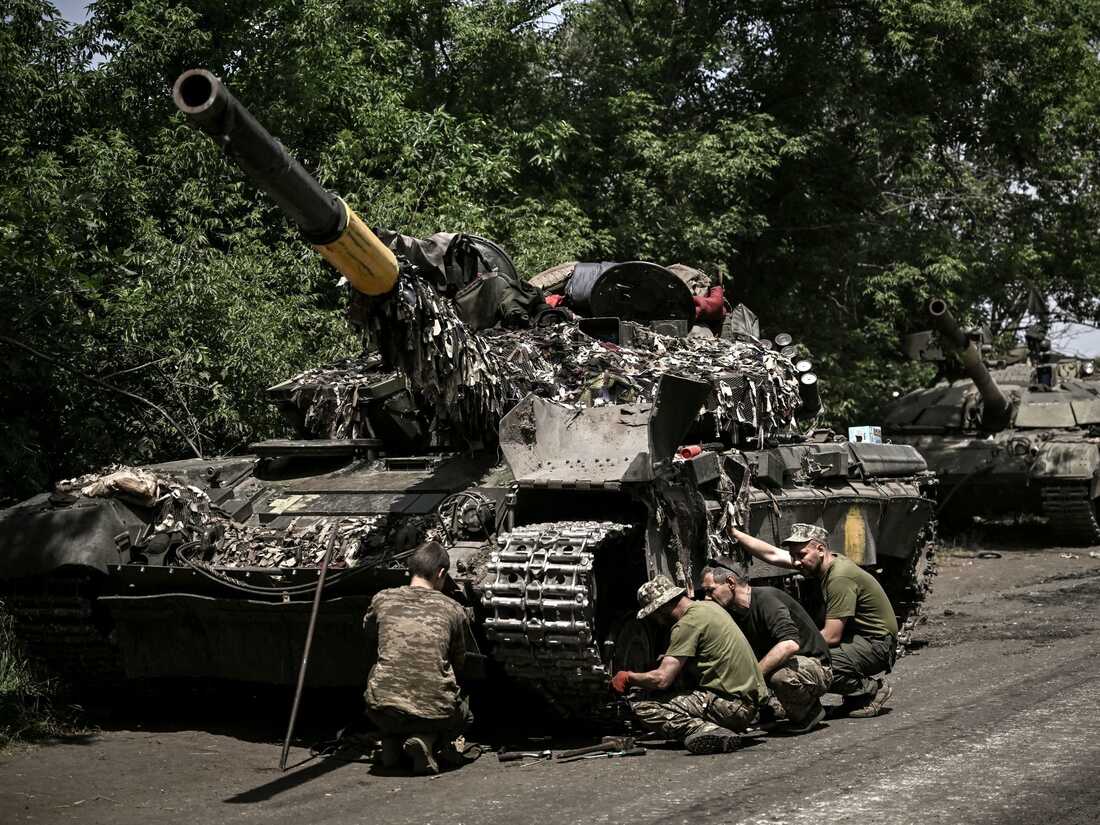STEVE INSKEEP

Russia is advancing in eastern Ukraine by deploying its superior numbers. "The math problem is very difficult for the Ukrainians," Gen. Mark Milley, chairman of the Joint Chiefs of Staff, said in an interview with NPR's Morning Edition. An army gains an advantage when it concentrates more forces at a decisive point than its enemy does.
In the war's early weeks, Russia scattered its forces, attacking multiple objectives at once and failing to capture Ukraine's capital, Kyiv. Russia then refocused, withdrawing some forces and placing heavier emphasis on the eastern Donbas region. Milley, President Biden's top military adviser, told NPR that Russia has massed greater numbers of combat units, as well as more artillery, than the local defenders have.
At the time of the interview on Wednesday, Milley was visiting NATO headquarters in Brussels. He was meeting officials from allied nations to coordinate their efforts to make "the math problem" work out.
Ukrainians have been urging the U.S. and its allies to supply more weapons than they already have — and they too are thinking of the math problem. "The math is clear," Ukrainian presidential adviser Mykhailo Podolyak told NPR's Greg Myre this week. "We will need parity of weapons if we're going to be effective in any sort of counteroffensive."
U.S. officials used their visit to Brussels to reject claims that U.S. aid is too small or slow. Defense Secretary Lloyd Austin said Ukrainian forces are training to use truck-fired rocket systems donated by the U.S. — and he emphasized the math. The U.S. is sending only a handful of the systems, but he said their effect is multiplied because they can simultaneously launch multiple precision-guided missiles.
Milley told reporters that the U.S. and its allies have contributed 97,000 Javelin missiles and other anti-tank weapons, which Milley calculated was "more anti-tank systems than there are tanks in the world."
In the NPR interview, Milley nonetheless acknowledged that Russia's larger military has been advancing in the Donbas region. "It's a fair statement to say that they're gaining ground tactically, but it's very, very slow," he said. Many Russian attacks have gained only a few hundred meters of ground before stalling. The advances are not "strategically" important, he asserted. At the news conference, he called it a "very severe battle of attrition, almost World War I-like."
Attrition, of course, affects the math. Asked if Ukraine, with its smaller army and much smaller population, was running out of trained troops, Milley acknowledged the difficulty but expressed hope by using an equation. "The moral is to the physical as 3 is to 1, as the saying goes," he said. In other words, Ukrainians' higher morale will multiply their strength as they defend their homeland. Milley cited media estimates that Ukraine has raised as many as 700,000 troops, enough to greatly outnumber the original Russian invasion force.
Many are not properly armed or trained, however. Properly arming them was Milley's focus during the visit in Brussels. At one point in the NPR interview, he noted, "We're only 110 days into this thing" — and the word "only" suggested how many more days of ruthless destruction may remain before the war's end.
No comments:
Post a Comment